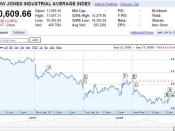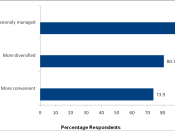"Exchange Traded Funds (ETFs)"
I. Overview
A. What is an Exchange Traded Fund?
Before any comprehensive analyses can be given on ETFs, the most pertinent first question would be, what is an Exchange Traded Fund (ETF)? An ETF is any type of investment vehicle which combines the benefits that a stock has versus mutual funds (i.e. such as being able to be bought and sold intraday), with the diversification and investment principals of a standard mutual fund. In short, think of an ETF as a mutual fund that is treated exactly like a stock. You can short ETFs, buy on margin, and trade intraday as aforementioned.
B. What Types of Funds can be made into ETFs?
Now not all mutual funds can be made into an ETF, so the next most pertinent question would be to ask what types of funds can (or rather most likely) qualify to become an ETF? While the most common investment vehicle is either an equity or debt index such as the S&P500 (SPY), NASDAQ (QQQQ), or Lehman Brothers Aggregate Bond Index (AGG), it has also grown to include international indexes (such as the FTSE China 24 index) and particular sectors as well (such as energy sector, healthcare sector).
There are even ETFs for REITS and the Comex Gold Index as well. Commodities do not presently have any ETFs, since there are complications such as to where the entire actual commodity would be stored while these ETFs were traded on a daily basis, has somewhat stalled its release. Still in 2005, the American Stock Exchange is slated to release the first ever commodities ETFs.
When the ETF tracks a particular index, its investment objective is clear; to achieve the exact same return as the index it is tracking does. Usually, this precipitates investing in the...


